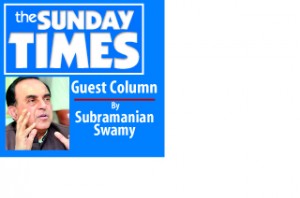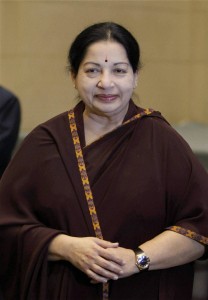News
Jayalalithaa’s credo: Rely only on yourself and money is all that matters
View(s):I took oaths on November 21, 1990, as the senior most Cabinet Minister of the Chandrashekhar-led Janata Party government with two portfolios—Commerce and Law and Justice. As the party President then, I was instrumental in working out a coalition with the Rajiv Gandhi-led Congress Party to dislodge the V.P. Singh coalition government and was, hence, a very powerful Minister in the Chandrashekhar Cabinet.
 Ms. Jayalalithaa was then in “exile” in Hyderabad, as head of a splinter Anna Dravida Munnetra Kazhagam (ADMK) faction. She was afraid of being assassinated by the Dravida Munnetra Kazhagam (DMK), which had taken office in Tamil Nadu in 1989. She called me after I took office because she had met me twice earlier, once in the Delhi airport when our flight had been delayed for three hours. In that meeting, we came to know each other, gossiping on a wide variety of topics.
Ms. Jayalalithaa was then in “exile” in Hyderabad, as head of a splinter Anna Dravida Munnetra Kazhagam (ADMK) faction. She was afraid of being assassinated by the Dravida Munnetra Kazhagam (DMK), which had taken office in Tamil Nadu in 1989. She called me after I took office because she had met me twice earlier, once in the Delhi airport when our flight had been delayed for three hours. In that meeting, we came to know each other, gossiping on a wide variety of topics.
On the phone after I became Minister, she urged me to protect her from Karunanidhi which I did by ordering the highest level security of Z+. Later, she invited me to dinner and told me her woes from childhood. I did feel sympathy for her then.
Soon reports of LTTE penetration in Tamil Nadu began to be filed with me in my red Minister’s inbox. It led me to conclude that Karunanidhi was planning with the LTTE to secede Tamil Nadu from India. I therefore met the PM, and persuaded him to agree to dismiss the DMK government under Article 356 of the Constitution.
I was in-charge of the operations, and I ensured that we achieved the takeover of the state with minimal resistance. But the Central Government was obliged to hold fresh elections within six months after the dismissal, but we held it within four months. The Parliamentary elections also became due then because of political differences between Chandrashekhar and Rajiv.
Unfortunately, Rajiv Gandhi was killed mid–election by the LTTE, and the elections were disrupted. But we overcame that disruption and with a wave of voter sympathy wiped out the DMK at the polls. Both Rajiv and I had earlier decided on projecting Jayalalitha as CM and thus she became the Chief Minister of Tamil Nadu in June 1991.
No sooner she became CM her whole attitude towards me changed. I found she hated to share credit for any good that happened. I found out to my dismay that her personal considerations motivated her political actions. Good and bad were differentiated in her mind, ridden with angst rooted in a troubled childhood and cinema brutalised past.
This is reflected in her autobiography published in the Tamil weekly Kumudam in 1978. Her father is presented as a “squanderer and a gentleman of leisure”, a man “who could not handle anything properly”. MGR is a person who she said she would rather “treat as an equal rather than a superstar”. A “betrayal” by a school friend, too, left a deep impression. Jayalalitha had played postman for this friend who was in love with a neighbour. But “when the girl’s mother discovered what was going on, my friend played Brutus and painted me as a daughter of an actress and a girl of loose morals.”
This overwhelming sense of being “used” seems to have influenced the worldview of the otherwise precocious and sensitive girl who dreamed of “a lawyer”. Her dream world collapsed when her mother Sandhya—also was B-grade actress—revealed that a “financial crisis in the family” meant “Jay” would have to give up studies and start acting.
So the 16-year-old, top of her class in studies, instead of going to the elite Stella Maris College, went to the sets of director C.V. Sridhar’s film ‘Vennira Aadai’ (Widow’s Robe). An ironic title for a woman who never married, although she confesses she never understood “the word platonic” and believed that “either there is a romantic relationship between two people or they are just friends”.
A loner, Jayalalitha seems to have harboured distrust for others early in life. “The experiences I have been through, the suffering and pain have taught me an important lesson: in life there is one person you must rely on—yourself.” She herself told me one day: “Life has put me through a wringer”. But one conviction she held onto very strongly: Money is all that mattered in life. You can buy anyone if you can afford the price asked.
That is the philosophy that has landed her in jail. Greed has been her undoing because she failed to perceive that there are humans who are not amenable to money.
Because of this greed and philosophy that money buys everything including respect in society, Ms. Jayalalitha has been found guilty in a disproportionate assets case by a Special Court in Bangalore, and sentenced to four years in jail in addition to a Rs. 100 crore fine.
The case had been on for the past 18 years, going back to 1996 when I filed a complaint under Section 13(1)(e) of the Prevention of Corruption Act, against Jayalalitha and her special friend Sasikala. Jayalalitha had just been voted out following my four-year campaign against her corruption and accumulation of assets disproportionate to her known sources of income.
The government at the time was Jayalalitha’s rival party, the DMK, which then directed the Vigilance Department to file an FIR against the former chief minister based on a police investigation instigated on my private complaint.
Jayalalitha was accused of acquiring at least Rs. 66.65 crore in assets that could not be explained by her known income. Later the same year, a Chennai court added the names of her close aide Sasikala, foster son Sudhakaran and another aide Ilavarasi, to the case.
Surprisingly, Jayalalitha sued for peace with me. On September 15, 1997, she came to my residence and said I should forget all, blaming it on her inexperience and asking for help to fight Karunanidhi. I agreed but made it clear I would not withdraw my cases filed against her. She agreed. We together joined the NDA, which then came to power at the centre. Soon she was unhappy with the NDA because she suspected Prime Minister Vajpayee was pro-DMK. She told me that they were making us scrape the bottom of the barrel. She urged me to use my skills to topple the Vajpayee government. This I did in April 1999, but NDA returned to power in the consequent elections.
However, Jayalalitha returned to power in the Tamil Nadu State Assembly elections in 2001. So the DMK, now a constituent of the NDA at the Centre, moved the Supreme Court in early 2003 requesting the case be moved out of the state so that a fair trial could be had.
The apex court agreed to the request and transferred the trial to a Special Court in Bangalore, with the damning observation that a ‘fair trial was not going on’ in the Chennai courts. In 2006, Jayalalitha lost the state elections to the DMK.
The case dragged on in court till 2011 on one technicality after another raised by Jayalalitha’s highprice lawyers, when Jayalalithaa was again elected CM after a five-year break in power when the DMK was back in the saddle.
The trial finally concluded on August 28, 2014, an agonising 18 years after it was first filed. On September 27, 2014, the special court found Jayalalitha guilty of corruption under the Prevention of Corruption Act and sentenced her to four years in jail and Rs. 100 crore fine.
This also meant that she had to resign as CM immediately under new guidelines for elected officials under the Representation of the Peoples Act. She also had to resign as a Member of the Legislative Assembly and was barred from contesting elections for the next six years, after serving the four-year sentence unless the conviction is overturned by a higher court. The verdict has a long-term impact on Tamil Nadu, since Jayalalithaa has no viable successor.
A huge political vacuum has resulted in the state. As far as the DMK is concerned, its credibility has been destroyed on the basis of the 2G Spectrum Scam, of which I’m also author. It’s an ongoing trial and it is possible that Karunanidhi’s wife and daughter will also go to jail. I can’t see the DMK as a credible alternative unless the public has no other choice.
As far as Jayalalitha is concerned, no matter how much she tries to whitewash and play victim, she won’t be able to overcome this because there is now a sense of shock. Of course, people knew what was going on but the findings of the court has made a stark reality of something they thought was just propaganda by other people.
There is a change in the demographic composition of Tamil Nadu with a very high proportion of young people. Fifty percent of the Tamil population is below 35 and they are highly trained software engineers, management experts and other professionals. They had not been very interested in politics because it was controlled by two Dravidian parties which were violent types. People voted but didn’t participate.
Now an opportunity exists for the BJP to project itself as a party who can reconnect Tamil Nadu to all India politics. There had been a tradition like that before, till Congress failed in the mid-60s and the DMK came in. BJP has an opening, but over the years its leadership has acquired Dravidian characteristics. They had been in alliance with them, picked up their bad habits and raised only local issues. This happened over years of isolation in Tamil politics. There has to be a reorientation of the BJP leadership to project itself as a branch of an all India party instead of just a Tamil component of the all India party. They can raise peripheral issues connected with Tamil Nadu, such as fishing rights, but it should be in passing.
I would conclude that some of us are working on it and we are very confident.
= The writer is a BJP leader

